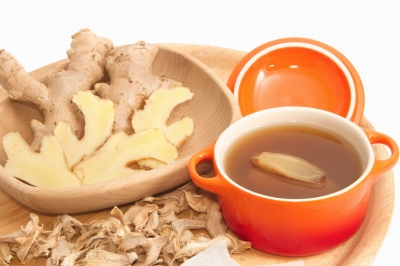|
Treating the Flu at Home:
This blog post is designed to help you prevent and treat the flu at home. It's a simple post because it should be simple. The best thing you can do to prevent the flu is to be as healthy as you can be. If treatment of the flu becomes in any way complex or confusing, you should seek the care of a health care provider, like your naturopathic doctor! Also, if you suffer from any significant medical conditions, please consult a health care provider before implementing any of the suggestions below. Do I Have the Flu? The flu (influenza) is a virus, whereas the common cold can be bacterial or viral. The symptoms of the flu differ from the cold in that you can have a higher fever, severe headache, extreme fatigue, stronger muscle aches and pains, and more chance of serious complications. Here's a great link if you want more details on this topic. Food The first thing you can do to prevent, and treat, the flu is to eat garlic, onions, and ginger. They help improve symptoms and have potent antimicrobial action (which means they fight viruses and bacteria extremely well). Even better, they do so without creating resistance (you might have heard about certain bacteria developing a resistance to antibiotics). Here are some ideas for how to prepare them: a) Garlic - The most important thing to remember is that it is ideal to eat garlic raw and freshly cut, otherwise it loses a lot of its medicinal action. If you're hard core, you can just gnaw on a bulb of garlic. If you want to make things a bit easier on yourself, try making raw garlic toast. I toast (gluten-free) bread, put some olive oil or margarine on it, and then top it with peeled and thinly sliced garlic. You can put the garlic through a garlic press if you'd like. b) Onion - Again, raw and freshly cut is ideal. It's not too hard to add chopped onions to many of the dishes you eat. c) Ginger - the easiest way to eat the ginger is to make tea. Simply peel fresh ginger, slice it into rounds, and pour boiling water over it. You can add honey to this tea. Homeopathy a) Prevention - some naturopathic doctors and homeopaths offer homeopathic prevention options. Please note that this treatment is not meant to replace a vaccine. I offer a homeopathic dilution of the seasonal Influenza vaccines recommended by the World Health Organization for use during 2013-2014 in the northern hemisphere, containing:
b) Immuno-Stimulants - there are homeopathic products designed to stimulate your immune system during the flu season. These products are best prescribed by your health care provider, especially because there are many health conditions that prohibit immunostimulation. C) Symptom Relief - Homeopathic products are often a great treatment for the flu! It's starting to become easier to find good homeopathic products at local grocery stores and pharmacies, along with the health food stores that have always carried them. Naturopathic doctors and homeopaths can prescribe the ideal remedies for you, drawing from their wealth of training and clinical experience. Botanical Medicine Botanical medicine is a fantastic way to treat and prevent the flu. There have been a few plants that have become very popular over the last few years, including echinacea, elderberry (sambucus), and oregano oil. There are plants that are referred to as adaptogens, which help the body deal with stress without becoming depleted, which can be very helpful for flu prevention. There are also many plants that stimulate the immune system, making it more able to fight off the flu. Last but not least, plants have antimicrobial action and help relieve symptoms. I do not recommend self-prescribing botanical medicine, as a rule. There are risks involved, including contraindications with prescription drugs or health conditions. I carry an herbal dispensary of over 50 tinctures (liquid extracts made from herbs), and I recommend patients come see me so that I make them their own specialized botanical tincture that best addresses their health status, symptoms, and concerns. Though my treatments can have antimicrobial action, I will, and do, refer patients to a medical doctor if they will be better served by conventional medicine, such as antibiotics. Lifestyle The three most important lifestyle changes you can make to prevent the flu are: a) Sugar - eat less of it! It suppresses your immune system and can help you to over-extend yourself with artificial surges in energy. b) Sleep - get lots of it. A well-rested body, and immune system, is better able to defend itself. c) Wash your hands and don't touch your face - This is, singlehandedly, the most most important thing you can do to prevent the flu. Touching your eyes, mouth, and nose after you've touched a contaminated surface is often how the virus gains access to your body. Or course, it is also prudent to avoid having anyone sneeze into your eye. Hydrotherapy There are a couple of great things you can do to help your immune system just using water! a) Contrast Showers - At the end of your shower, alternate between a few short periods of cold water, and longer periods or warm water, always ending in cold. The temperatures do not need to be extreme, and please be cautious if you suffer from any sort of health problems (cardiovascular disease, in particular). One of the main ways the contrast shower bolsters your immune system is by causing your body to pump blood to and from the surface. This helps your body clear metabolic waste, delivers fresh nutrients to your cells, and stimulates the lymphatic system (a vital part of your immune system). It often feel terrible while you're doing it, and wonderful once you're done. b) Neti Pot - the neti pot is a great tool in flu prevention, particularly during the winter in a cold climate. It can soothe and moisturize your mucus membranes, making them more able to withstand the flu. It can also help clear allergens out of the nasal passages, which can reduce inflammation. Conventional Medicine A brief word about fever-reducers (Tylenol, ibuprofen, etc.), specifically that you should approach their use with caution. Here's a great article about 'fever phobia.' Some of the most important points are:
When to Seek Help The following (in green) is an excerpt from the Ontario Ministry of Health website. It references children, but it applies to everyone! If you're in doubt about whether or not you are ok, just err on the side of caution and call your health care provider! Call 911 right away or take your child to the nearest hospital emergency department if your child has new onset or worsening of the following symptoms:
[Image courtesy of Praisaeng / FreeDigitalPhotos.net]
1 Comment
5/27/2015 10:00:44 pm
I like this concept. I visited your blog for the first time and became your fan. Keep posting as I am going to read it everyday.
Reply
Leave a Reply. |
AuthorDr. Dielle Raymond, ND Archives
March 2020
Categories |
This website is intended for educational purposes only. There are no contents on this website that are intended to provide medical advice, diagnosis, or treatment. Copyright ©2023 Dr. Dielle Raymond, ND. All Rights Reserved.


 RSS Feed
RSS Feed